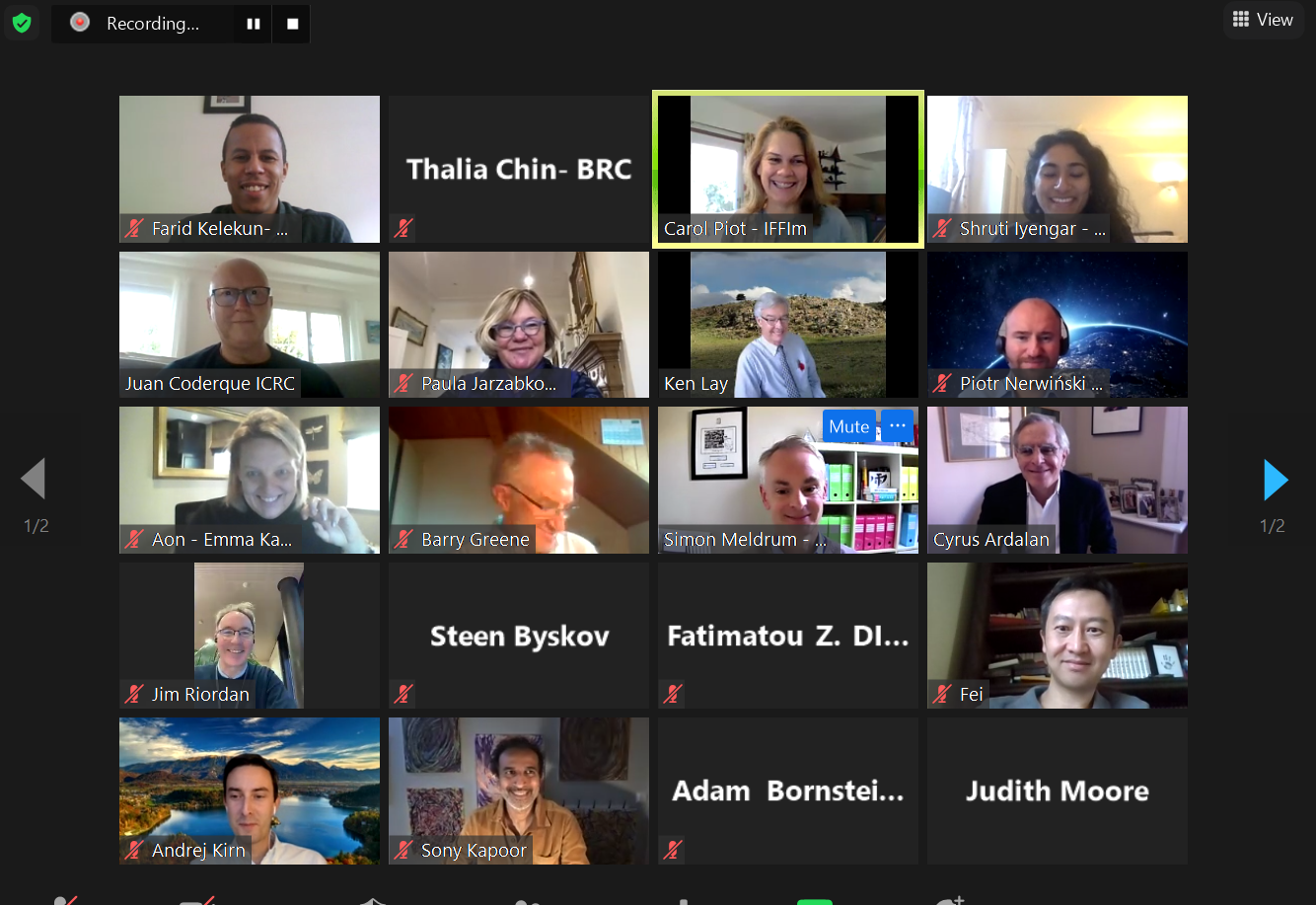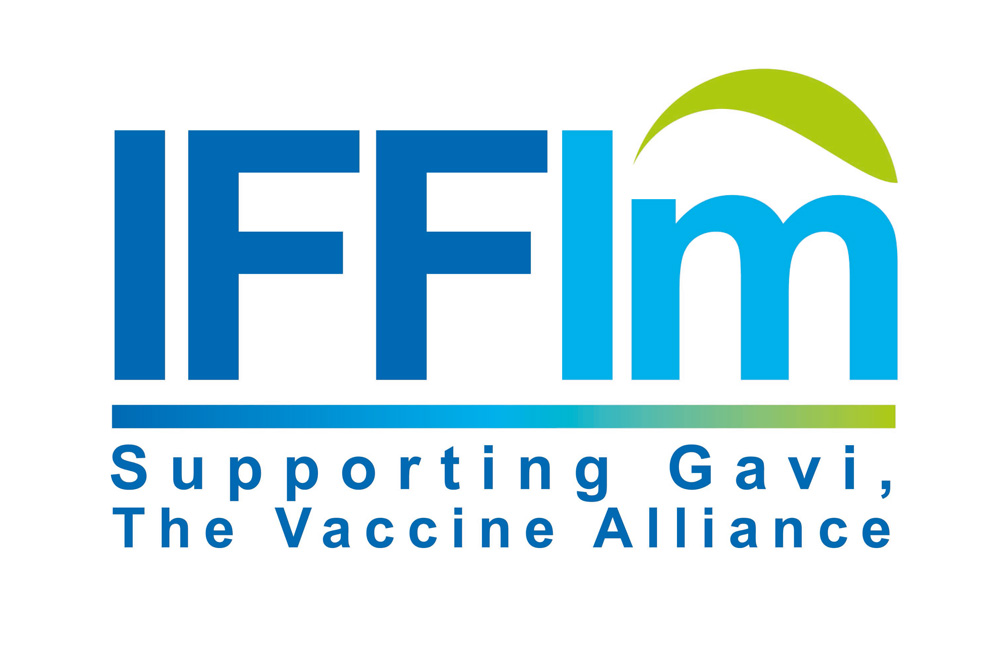The Innovative Humanitarian Financing Forum to develop collaboration with WEF
The Innovative Humanitarian Financing Forum to develop collaboration with WEF
19 November 2020

Participants join the virtual roundtable discussion
The Innovative Humanitarian Financing Forum (IHFF), founded by leaders from IFFIm’s Board and the British Red Cross, convened online on 4 November 2020, bringing to the table 33 people from 17 organisations, both returning and new participants, to explore ways to catalyse humanitarian investing initiatives.
Launched to enthusiastic response in London in March 2020, just days before the COVID-19 pandemic forced borders and institutions to close, the IHFF is a group of stakeholders from humanitarian organisations as well as the private sector who are dedicated to finding ways to fund the gap between private finance, public and philanthropic funding to confront growing crises in health and safety in low-income countries.
The November meeting took place at a time of great momentum for humanitarian finance. As the world eagerly awaits a new vaccine against coronavirus, a new US$ 500 million IFFIm Vaccine Bond made headlines as a mechanism that could surge immediate funding for humanitarian crises.
Representatives from Red Cross, IFFIm and London Business School led discussions touching on several themes, from defining the purpose of IHFF in 2021 and exploring collaborations with likeminded organisations.
Defining the sector, closing the gap
Shruti Iyengar from the London Business School opened the discussion with a short presentation and analysis of instruments like social, impact and sustainable bonds and cited the growth of green bonds as an illustration of what the market could look like. There is no agreed to definition of “innovative finance,” she said. Rather, it is more accurate to talk about the emerging sector as “innovative humanitarian finance.”
A framework for IHFF: accelerating financing for global public good
Finance executive and former World Bank Treasurer Kenneth Lay, newly appointed to the IFFIm board and its next Board Chair, talked about a topic central to IHFF’s purpose: scale and affordability in funding global public goods.
“The needs are huge and growing,” said Mr Lay. “There continues to be poverty in much of the world; disease and pervasive health issues, especially among the poor; climate change; biodiversity restoration; and now, the COVID-19 pandemic.”
Mr Lay pointed to the estimated $200 Trillion global savings pool that has increased during the 2020 pandemic and a growing percent allocated in ethical investing. Knowing this interest and money exists, the humanitarian financing community must step up investment in crucial development work and humanitarian response through new tools. Mr Lay cited relevant examples of innovative product types including direct market financing, front loading, outcome-based financing, risk-sharing mechanisms, debt restructuring and voluntary concessionary financing.
“While there’s a ‘chicken and egg’ effect, getting the financing tools in place will support program development,” said Mr Lay. “If project and program originators see access to low-cost, long-term financing at the end of the process, they’ll be more willing to source and build out these important humanitarian initiatives.”
Mr Lay endorsed IHFF as a cross-sector forum that aims to engage humanitarian actors with stakeholders from public and private sector These include developers of projects and programs supporting global public goods; sovereigns and others in the official sector; bankers and investment managers; NGOs and philanthropies; and others. Mr Lay encouraged forum participants to think outside their sector and network to move forward. “This effort will require creative thinking and new approaches,” concluded Mr Lay. “That may not be easy going. It’s a new way to think and work,” he said.
Common results: IHFF and WEF’s Humanitarian and Resilience Investing Initiative (HRI)
Simon Meldrum, Innovative Finance Specialist from the British Red Cross, and Andrej Kirn, Head of International Organizations and Humanitarian Agenda at the World Economic Forum (WEF), addressed ways in which these humanitarian initiatives are interested in common results.
Mr Kirn introduced the HRI Initiative, which brings together key humanitarian and development actors and representatives from the investor and corporate communities. Co-Chaired by WEF, World Bank Group, ICRC, Credit Suisse, and the Netherlands, the HRI aims to accelerate and shape the market for humanitarian and resilience investing by unlocking part of the $200 trillion of invested private capital.
The HRI, with is broader scope and longer time frame, complements IHFF’s community of practice and on-the-ground presence in London, said Mr Kim, outlining ways the two groups will be working in a cohesive and more structured relationship in the coming months.
About IHFF
The Innovative Humanitarian Financing Forum (IHFF) was founded in March 2020 to bring together representatives of public and private institutions in business, banking, charities and humanitarian organisations to explore how novel financial tools and instruments could expand resources for urgent humanitarian needs, from health emergencies and education to sanitation, hygiene and climate change.
Share this article
Restricted Access Library
 The material in this Restricted Access Library is intended to be accessed only by persons with residence within the territory of a Member State of the European Union and is not intended to be viewed by any other persons. The material in this Restricted Access Library is provided by IFFIm for information purposes only and the materials contained herein were accurate only as of their respective dates. Certain information in the materials contained herein is not intended to be, and is not, current. IFFIm accepts no obligation to update any material contained herein.
The material in this Restricted Access Library is intended to be accessed only by persons with residence within the territory of a Member State of the European Union and is not intended to be viewed by any other persons. The material in this Restricted Access Library is provided by IFFIm for information purposes only and the materials contained herein were accurate only as of their respective dates. Certain information in the materials contained herein is not intended to be, and is not, current. IFFIm accepts no obligation to update any material contained herein.
Persons with residence outside the territory of a Member State of the European Union who have access to or consult any materials posted in this Restricted Access Library should refrain from any action in respect of the securities referred to in such materials and are otherwise required to comply with all applicable laws and regulations in their country of residence.
By clicking Access restricted content: DYNAMIC-LINK-TEXT I confirm that I have read and understood the foregoing and agree that I will be bound by the restrictions and conditions set forth on this page.
The materials in this Restricted Access Library are for distribution only to persons who are not a "retail client" within the meaning of section 761G of the Corporations Act 2001 of Australia and are also sophisticated investors, professional investors or other investors in respect of whom disclosure is not required under Part 6D.2 of the Corporations Act 2001 of Australia and, in all cases, in such circumstances as may be permitted by applicable law in any jurisdiction in which an investor may be located.
The materials in this Restricted Access Library and any documents linked from it are not for access or distribution in any jurisdiction where such access or distribution would be illegal. All of the securities referred to in this Restricted Access Library and in the linked documents have been sold and delivered. The information contained herein and therein does not constitute an offer for sale in the United States or in any other country. The securities described herein and therein have not been, and will not be, registered under the U.S. Securities Act of 1933, as amended (the "Securities Act"), and may not be offered or sold in the United States except pursuant to an exemption from, or in a transaction not subject to, the registration requirements of the Securities Act and in compliance with any applicable state securities laws.
Each person accessing the Restricted Access Library confirms that they are a person who is entitled to do so under all applicable laws, regulations and directives in all applicable jurisdictions. Neither IFFIm nor any of their directors, employees, agents or advisers accepts any liability whatsoever for any loss (including, without limitation, any liability arising from any fault or negligence on the part of IFFIm or its respective directors, employees, agents or advisers) arising from access to Restricted Access Library by any person not entitled to do so.
"Relief" for mothers in Bayelsa state as malaria vaccine makes waves
07 November 2025
